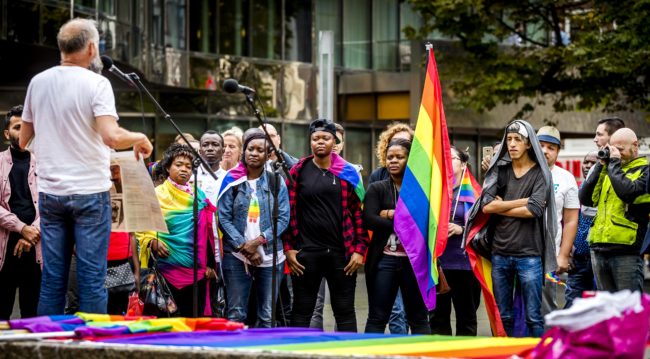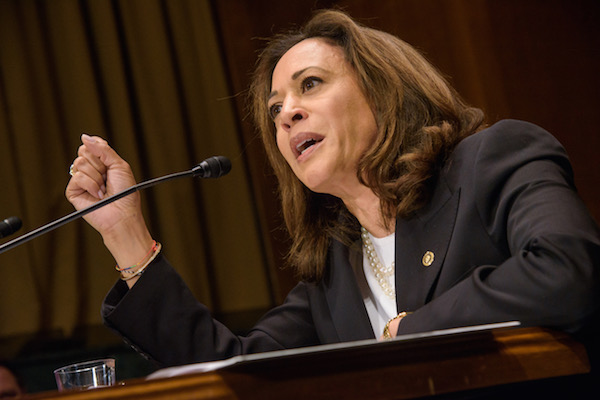LGBTQ Immigrant Detainees Reported Sexual Assault At Higher Rates
Immigration and Customs Enforcement detained transgender women in all-male facilities and locked them up on average for more than twice as long as immigrants overall, according to figures the agency provided to Rep. Kathleen Rice (D-N.Y.).
The figures ICE shared with Rice shed light on how LGBTQ immigrants are treated in such facilities at a time when the Trump administration is seeking to dramatically expand detention ― including for asylum-seekers and LGBTQ people who may be uniquely vulnerable to sexual abuse.
ICE doesn’t publish annual reports on allegations of sexual assault or treatment of LGBTQ people within its detention centers but provided figures to Rice in response to her requests.
Self-identified LGBTQ people made up only about 0.14 percent of the immigrants detained last fiscal year by ICE, but accounted for more than 12 percent of the alleged victims of sexual abuse and assault, according to the figures.
Rice said she was “deeply disturbed” by the information ICE shared with her office. She and 36 other Democratic House members on Wednesday are sending a letter to Homeland Security Secretary Kirstjen Nielsen to ask ICE to use its discretion to release more LGBTQ immigrants on parole or other alternatives to detention.
“ICE should not be using its limited resources to detain hundreds of people who are vulnerable to abuse and pose no threat to public safety,” she said in a statement provided to HuffPost.
ICE has not yet begun to publish annual reports on sexual assault allegations in detention as required by the Prison Rape Elimination Act. The first report is under internal review and the agency plans to begin publishing relevant statistics online in the near future, a spokesperson said.
ICE received 227 reports of sexual abuse and assault in the 2017 fiscal year, 28 of them involving an LGBTQ victim, the agency told Rice. Overall, there were 467 people who disclosed being LGBTQ during intake, of the total 323,591 people detained that year, according to the figures.
Those figures were slightly different than the ones ICE gave to HuffPost. A spokesperson said there were 237 reports of sexual abuse and assault in the 2017 fiscal year and that 26 involved an LGBTQ victim. ICE could not confirm the number of immigrants who self-identified as LGBTQ during their intake. In April, ICE told The Intercept there had been 237 allegations and that 23 involved LGBTQ victims. (A spokesperson said figures can change in ICE’s database if allegations are added or are found to be duplicates.)
ICE should not be using its limited resources to detain hundreds of people who are vulnerable to abuse and pose no threat to public safety. Rep. Kathleen Rice (D-N.Y.)
In each set of figures, though, self-identified LGBTQ immigrants made up a sizeable share of the total alleged victims of sexual assault in ICE detention last fiscal year ― more than 10 percent.
ICE detained 247 self-identified transgender immigrants in the 2017 fiscal year, the agency told HuffPost. And many of those individuals spent lengthy periods in detention. ICE told the congresswoman that the average length of time transgender people were detained in the 2017 fiscal year was 99 days, compared to an average of about 44 days for all immigrants, according to Rice’s office. One in eight transgender people in ICE detention during that fiscal year was placed in solitary confinement, the agency told Rice’s office.
Some transgender immigrants were detained in facilities that did not correspond to their gender identity. Transgender women were detained in five all-male detention centers over the course of the 2017 fiscal year, along with 14 other facilities that housed only women or both genders.
An ICE spokesperson said that it makes decisions about where to hold detainees on a case-by-case basis, considering factors including the individual’s preference and their safety and well-being.
But that doesn’t seem to be happening as much as it should, said Sharita Gruberg, an associate director of the progressive Center for American Progress think tank who for years has tracked LGBTQ treatment of detained immigrants.
“They’re detaining people regardless of the vulnerability that they face in detention,” she said. “It doesn’t seem like there is really an assessment happening ― if you are deportable and you’re arrested, you’re getting detained.”


